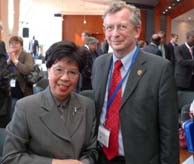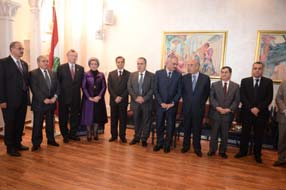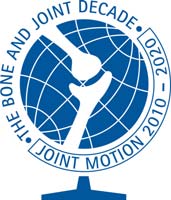SICOT e-Newsletter
Issue No. 46 - July 2012
Editorial by Marcos Musafir & Tony Woolf - Bone and Joint Decade (BJD)
The Bone and Joint Decade (BJD)
There are millions across the globe who are affected by musculoskeletal conditions (MSCâs) yet the WHO Global status report on non-communicable diseases 2010 confines itself to the four NCDâs with high mortality: cancer, cardiovascular, diabetes and chronic respiratory. There is scarcely a mention of musculoskeletal conditions, or any other non-communicable disease with low mortality and high morbidity rates.
The Bone and Joint Decade (BJD) is dedicated to raising recognition of the importance of musculoskeletal conditions at global, regional and national levels.
Globally, over the past year the BJD International Coordinating Council (ICC) has developed much closer ties with the World Health Organisation (WHO). These efforts have been spectacularly successful. The BJD is now positioned at a high level at the WHO and has made a significant contribution on a number of issues.
In April 2011, BJD Chair Tony Woolf and ICC Member Mieke Hazes participated in the WHO Global Forum "Addressing the Challenge of Non-Communicable Diseases" (NCDâs) in Moscow, which recognised that modifying risk factors such as bad diets and physical inactivity are common to the prevention and control of MSCâs and other NCDâs.
In May 2011, the BJD proudly supported the launch of the WHO Decade of Action for Road Safety 2011-2020. To mark the launch, the BJD worked closely with the Archbishop and local authorities of Rio de Janeiro to organise a celebratory mass and the illumination of the Statue of Christ the Redeemer with the road safety "tag". The Decade of Action for Road Safety seeks to save 5 million lives over the ten-year period.

Prof Tony Woolf with Dr Margaret Chan, WHO Director General
In June 2011, Tony Woolf participated in the launch of the World Report on Disability by Dr Margaret Chan, WHO Director General, at the United Nations, New York. With more than a billion people in the world today experiencing disability, it was identified that better data on the nature and determinants of disabilities would improve the development and prioritisation of strategies for prevention of disability and rehabilitation.
In September 2011, the BJD participated in the UN General Assembly Non-communicable Diseases Summit in New York, which generated global commitment and momentum to implement a Global Strategy for Prevention and Control. The BJD submitted that the WHO approach to addressing NCD's was remiss in focusing on four diseases rather than launching on the underlying risk factors that are common to numerous NCD's, including MSCâs.
In October 2011, the BJD was invited to be one of only four partners in the WHO Global Alliance for the Care of the Injured in recognition of the instrumental role that the BJD played in the Global Forum on Trauma Care in Rio de Janeiro in 2009, the culmination of the work undertaken by Marcos Musafir while sponsored by the BJD to work at WHO Geneva from 2008 and 2009. During this time SICOT was an important partner in the projects developed with WHO.
In summary, 2011 has seen the status of the BJD climb significantly with the World Health Organisation working in particular in the areas of non-communicable diseases, trauma care and rehabilitation. Future efforts to maintain and further enhance this status will continue throughout 2012 with the ultimate ambition to achieve official WHO Non-Governmental Organisation status in due course.
The strength of the Bone and Joint Decade comes from its worldwide network. The BJD is supported by more than a thousand national and international professional, scientific and patient organisations. Bone and Joint Decadeâs national coordinators are established in 96 countries, while Bone and Joint Decade National Action Networks are driving the agenda and goals of the BJD in 61 countries.
The regional development of this network is on the agenda of the annual BJD World Network Conference. This is a strategically and scientifically important meeting, aimed at maintaining the momentum of the Bone and Joint Decade in raising the priority of musculoskeletal health and science.
The conference provides a forum for top opinion leaders in bone and joint health, the World Health Organisation, participants from leading societies, journals, and the BJD worldwide network.
The conference focuses on identifying the opportunities and benefits there are from working together, both between professions and disciplines but also across countries, and provides an opportunity for a summit of leaders in the region of the country hosting the conference to consider and agree how to work together to advance the priority for musculoskeletal health and with the potential to form a BJD Regional Forum.
In 2011, the BJD World Network Conference was generously hosted by Dr Ghassan Maalouf in Beirut under the auspices of the Lebanese Ministry of Health. Among the outcomes was the need to develop priority for musculoskeletal conditions in the Middle East. This resulted in the creation of the first Bone and Joint Decade Regional Forum bringing together professional and patient organisations from across the Middle East.

The opening ceremony at the Presidential Palace in Beirut
In 2012, the BJD World Network Conference will be hosted in Vietnam where the agenda includes a similar opportunity to develop a Regional Forum for South East Asia.
At the national level the networks play an active role to ensure that musculoskeletal conditions are among the leading major health concerns in the minds and actions of local opinion formers and for musculoskeletal health to be a public health priority. The aim is to improve the outcomes for people with these conditions, many of whom do not have access to appropriate care.
For 2012, the BJD will continue to invest in the development and support of its national networks and is developing an Advocacy Toolkit designed to develop and support the patient voice and to underpin an orchestrated and sustained campaign with consistent messages which will establish MSCâs as a major public health issue.
Our close affiliation with SICOT is highly valued and looking ahead to the future we are proud to announce that in 2014 the BJD will support activities related with Trauma Care and Fragility Fracture globally during the SICOT Triennial World Congress that will be held in November 2014 in Rio de Janeiro.
The Bone and Joint Decade is the Global Alliance for Musculoskeletal Health
